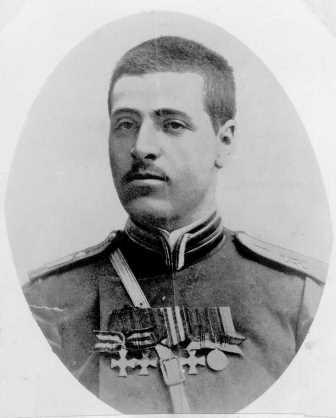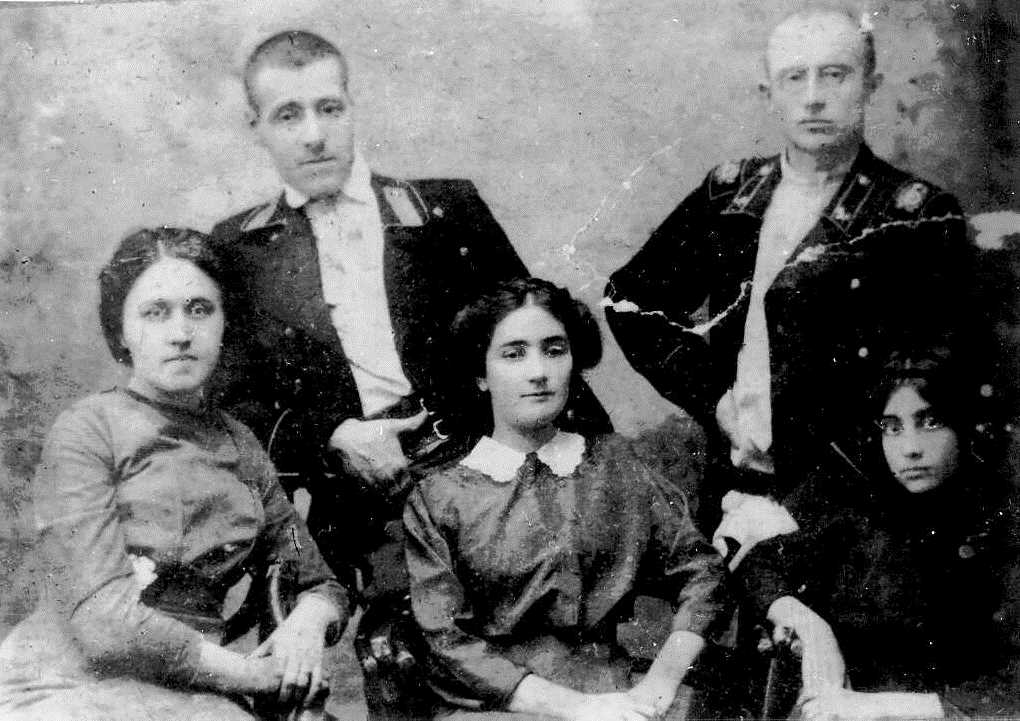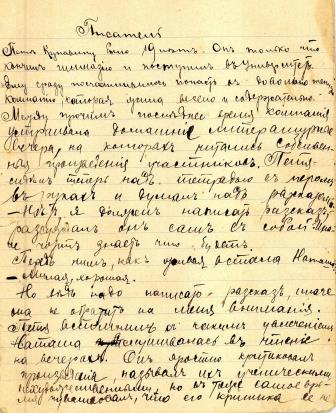Joseph Trumpeldor (1880-1920) is mostly known as a military man and is a symbol of relentless courage, but he had many faces: a decorated soldier in the Russian army and a hero of the battle of Tel Hai, but also a devout Tolstoyan who believed in the principals of non-militancy and an ideological vegetarian. As a man who was in constant evolution, he had varied interests, among them literature. Aside from his diaries and letters, that were translated to English and Hebrew, he wrote short stories from time to time, the manuscripts of which are kept in his personal archive in the Central Zionist Archives. The story before you, an ars- poetic, ironic inner dialogue, is one of them. It allows a glimpse into the soul of one of the most enigmatic characters in the pantheon of Zionist forefathers that continues to fascinate researchers to this day.


Left: Joseph Trumpeldor in Russian uniforms, with medals from the Russian-Japanese war (PHZPR\1250525) |
Right: Trumpeldor (left) with friends, 1912 (PHG\100516)
The Writer
Sesstia Kunavin was nineteen. He just graduated from the gymnasium and was accepted to university. He was soon lucky to find himself among a warm and close knit group that led a full and merry life. Of late, the group started to organize literary evenings in the homes of its members, where their own work was read aloud. Now, Petia was seating in front of an open notebook, quill in hand, pondering upon the story he will write. No, I must write a story, he debated with himself. Otherwise, the devil knows what will be.
Natasha appeared before his eyes, as she was in life – gentle, kind.
But the story must be written, or she will not notice me. Petia recalled, how fascinated Natasha was while listening to the works being read in those gatherings. He criticized those works furiously, calling them the works of amateurs, claiming this is not literature. But all the while, he felt his criticism isn't convincing her, and it was to her that he was speaking. He noticed that she seemed to take a liking to Vania Tattarov's stories. What does she see in them? Yes, they might be eloquently written, and show things as they are, but that is not enough. They lack the depth of true vision. One should…
Well, I will write my story, and they shall see how it should be done. And Petia began pondering again.
Well, alright, but what shall I write about? One needs to choose a broad topic. I could write about the essence of day to day life. There is nothing to it, if you're familiar with life.
 It seemed to Petia that he knew life well, and was ready to focus on some aspect of the essence of day to day life, but he changed his mind. No, the outlook should be broader. A work that deals with the essence of day to day life, as well- written as it is, will only be understood by those who are familiar with our own experience – only those of our time, and among these, only those who live in the same country. No, the piece needs to be symbolic. A story such as this will be understood by everyone, at any time. I shall write it and read it to them.
It seemed to Petia that he knew life well, and was ready to focus on some aspect of the essence of day to day life, but he changed his mind. No, the outlook should be broader. A work that deals with the essence of day to day life, as well- written as it is, will only be understood by those who are familiar with our own experience – only those of our time, and among these, only those who live in the same country. No, the piece needs to be symbolic. A story such as this will be understood by everyone, at any time. I shall write it and read it to them.I wonder what they'll say. The room will probably be silent after I have finished reading. They will be amazed. They won't believe it was I who wrote the piece. How cruel of them. How can I convince them I didn't copy the story from anyone? Although, I won't even try to convince; let them doubt. I will publish the story in a thick and respectable magazine of some sort. When they will read it, they will believe. And still, what shall I write about?
Manuscript for "The Writer" (A42\2)
Translated from Russian to Hebrew by Dina Markon. English translation: Noa Gerber.